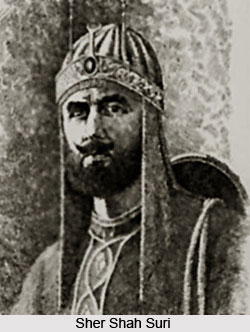 Islam Shah, the younger son of Sher Shah Suri succeeded to the throne after the death of his father. Though Sher Shah`s eldest son, Adil Khan was nominated by him as his successor but the nobles preferred Jalal Khan, Sher Shah`s younger son who was regarded more capable and industrious by them. Jalal Khan was called by them to come to Kalinjar and after his arrival, he was declared Sultan on 27 may 1545 A.D. He assumed the title of Islam Shah.
Islam Shah, the younger son of Sher Shah Suri succeeded to the throne after the death of his father. Though Sher Shah`s eldest son, Adil Khan was nominated by him as his successor but the nobles preferred Jalal Khan, Sher Shah`s younger son who was regarded more capable and industrious by them. Jalal Khan was called by them to come to Kalinjar and after his arrival, he was declared Sultan on 27 may 1545 A.D. He assumed the title of Islam Shah.
Conflict with Adil Khan
Islam Shah could not feel secure as long as his elder brother was alive. He asked him to come to Agra. He was assured of his life and the grant of Jagir of Sayan. Eminent nobles like Isa Khan and Khavass Khan stood surety for his life. Adil Khan went to Agra, paid homage to the Sultan and returned to Bayana. Islam Shah tried to murder him but failed. Feeling insecure Adil Khan sought support of Khavass Khan. They combined their forces and proceeded towards Agra but the rebels were defeated. Adil Khan fled towards Panna and was heard of no more. Khavass Khan also fled towards Sarhind.
The Revolt of the Nobles
Islam Shah tried to kill ail those nobles who were supposed to be in sympathy with Adil Khan. Thirteen old nobles were sent to Gwalior where they were blown by gun-powder. Said Niyazi fled away from the court and found shelter with his brother Haibat Khan Niyazi, governor of Lahore. Haibat Khat Niyazi revolted against the Sultan. Khavass Khan also came and joined him. Islam Shah went himself to suppress this revolt. He met the rebel near Ambala (1547 A.D.). Khavass left Haibat Khan on the eve of the battle because he wanted to fight in the name of Adil Khan while Haibat Khan was fired with the ambition of himself be crowned. The Niyazis were defeated and Islam Shah pursued them up to the bank of the Jhelum River. He left an army to suppress the fugitives and himself returned to Agra.
The Results of Revolts
Islam Shah succeeded in suppressing all revolts, He, thus, broke the power of the old nobility which could be a threat to the power of the Sultan. He appointed his own loyal nobles to all important posts and was able to command their respect. In this respect, Islam Shah proved more successful than his father. The provincial governors showed respect not only to him but even to his shoes and obeyed his commands blindly. But, this policy towards the nobles did not prove to be the lasting interest of the state. Two attempts were made to murder him though both failed. But the nobles could not remain loyal to the royal family. It was only the fear of Islam Shah which kept them in check during his life. Thus, Islam Shah`s greatest failure was that instead of consolidating the power of the Afghans he divided it and, thus, participated in the downfall of the second Afghan empire.
Administration under Islam Shah
Islam Shah was a worthy son of his father. He not only maintained the administrative set-up of his father but also strengthened it further. Sher Shah had constructed Sarais on every fourth mile. Islam Shah constructed Sarais on every second mile and arranged for free distribution of food in each of them. Islam Shah could not abolish the jagirdari system but he took away the land from old jagirdars and redistributed it among his loyal support. This measure created a class of people loyal to him and indirectly weakened the hereditary jagirdari system. He assigned the respectibility of maintaining law and order in villages to his officials. Islam Shah brought out changes in the army administration as well. He divided his cavalry into units of 50, 200, 250 and his infantry into 5,000, 10,000 and 20,000 soldiers.
In the north-west, he constructed a chain of forts, viz., Shergarh, Islamgarh, Rashidgarh, and Ferozgarh. Together, these were called the forts of Mankot. Islam Shah kept his nobles under strict discipline. Each of them respected or rather feared him very much. The nobles were terrorised by Islam Shah and remained under his strict control during his life-time. But this policy proved harmful for the dynasty in the long run. The Suri dynasty lost the love of Afghan nobles and, as soon as Islam Shah passed away, they tried to decide the fate of the throne by the power of their swords and were divided among themselves which ruined the fate of the Suri dynasty. The best novelty of the administration of Islam Shah was the framing of a very large number of administrative laws. His legislature practically covered every sphere of state activity and was universally applied throughout his empire. Islam Shah freed the laws from religion and enforced them purely on behalf of the state. Islam Shah was a capable administrator.
Islam Shah was a successful ruler. He not only provided order and security to the empire which he inherited from his father but extended it further. East Bengal was conquered during the last days of his rule. Not a single revolt succeeded during his time. He also tried to bring about improvement in the administration set-up by his father and succeeded in certain measures.



















